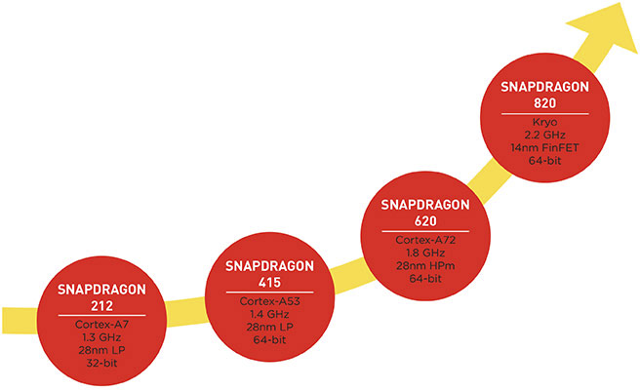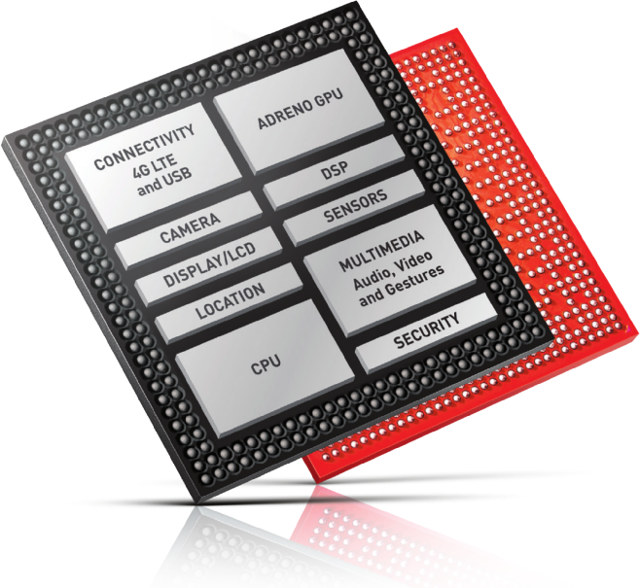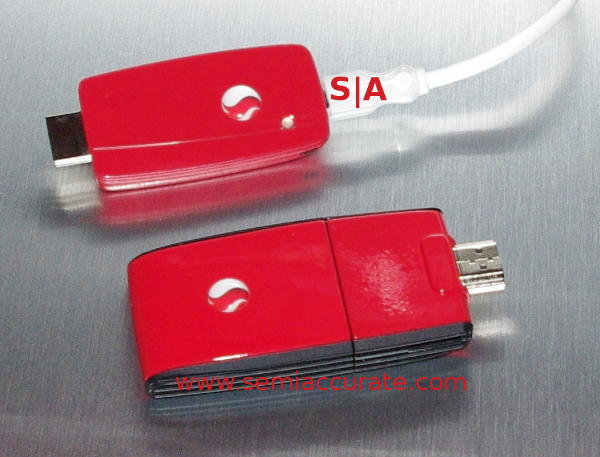Qualcomm has provided more details about Snapdragon 820 processor featuring custom-designed 64-bit ARM Kryo cores, an Adreno 530 GPU and an Hexagan 680 DSP, with claims that it should be twice as fast and consume half the power of Snapdragon 810 processor with Cortex A57 and A53 cores. Based on the chart below, it will also be faster than Snapdragon 620 with Cortex A72 and A53 cores. Snapdragon 820 will feature four Kryo cores (succeeding Krait cores) clocked at up to 2.2 GHz and be manufactured using 14nm FinFET process technology. Adreno 530 GPU is expected to deliver over 40% performance improvement over Adreno 430 GPU while also keeping power consumption 40% lower, a new Spectra camera dual ISP will support 14-bit sensors, and Hexagon 680 DSP adds a separate low power DSP for always-on sensor processing, and support for HVX (Hexagon Vector eXtensions) to be used for advanced imaging […]
Linux 4.2 Release – Main Changes, ARM and MIPS Architectures
Linus Torvalds released Linux Kernel 4.2 last Sunday: So judging by how little happened this week, it wouldn’t have been a mistake to release 4.2 last week after all, but hey, there’s certainly a few fixes here, and it’s not like delaying 4.2 for a week should have caused any problems either. So here it is, and the merge window for 4.3 is now open. I already have a few pending early pull requests, but as usual I’ll start processing them tomorrow and give the release some time to actually sit. The shortlog from rc8 is tiny, and appended. The patch is pretty tiny too. Go get it, Linus Some notable changes made to Linux 4.2 include: File systems New features for F2FS including per file encryption CIFS support SMB 3.1.1 (experimental) Cryptography – Jitter Entropy Random Number Generator, Chacha20 stream cipher and Poly1305 authentication (RFC7539),New RSA implementation. See lwn.net […]
Linaro 15.07 Release with Linux 4.2 and Android 5.1
Linaro 15.07 has been released with Linux 4.2-rc3 (Baseline), Linux 3.10.83, 3.14.45 and 3.18.17 (LSK), and Android 5.1.1_r8. The Linux kernel got various bug fixes, and a power reduction technique has been implemented for Qualcomm processor. Progress has been made to boot Android with UEFI on Hikey board, and work is still on-going on 96boards including Hisilicon Hikey, Qualcomm DragonBoard 410c, and an upcoming and yet-to-be-formally-announced Marvell PXA1928 board called Helium. Highlights of this release: Linux Linaro 4.2-rc3-2015.07 linaro-android topic updated to 4.2-rc3 and recent AOSP/android-3.18 included GATOR version 5.21.1 llct-misc-fixes topic: “HACK: of: Limit FDT size for CRC check on arm64” has been dropped. FVP model was the last target to require this hack, but the new FVP firmware doesn’t need it anymore updated integration-linaro-vexpress64 topic by ARM LT: Versatile Express TC2 support is back, HDLCD display now works on TC2, the topic will be renamed to integration-linaro-vexpress next […]
Qualcomm Dragonboard 410c is Another 96Boards Compliant 64-bit ARM Development Board
Linaro announced the 96Boards initiative at Linaro Connect Hong Kong last month, and in collarabation with Huawei announced Hikey development board following this new standard. Qualcomm has now joined the Fray with Dragonboard 410c, a 96Boards board powered by Qualcomm Snapdragon 410 quad core Cortex A53 processor. Dragonboard 410c specifications: SoC- Qualcomm Snapdragon 410 (APQ8016) quad-core ARM CortexA53 @ 1.2 GHz with Adreno 306 GPU @ 400MHz System Memory – LPDDR2/3 533MHz, Single-channel 32-bit (4.2GBps) Storage – eMMC 4.51 + micro SD 3.0 (UHS-I) Video Output – HDMI up to 1080p Connectivity – Integrated 802.11 b/g/n, BT/FM, GPS USB – 2x USB 2.0 host ports, 1x micro USB OTG port. Camera – Support for 13 MP camera with Wavelet Noise Reduction, JPEG decoder, and other post-processing techniques done in hardware Expansion: 1x 40 pin low speed expansion connector – UART, SPI, I2S, I2C x2, GPIO x12, DC power 1x 60 […]
Qualcomm Unveils Snapdragon 650 and 652 ARM Cortex A72 / A53 Processors
[Update: Title updated to reflect the new names of the processors. Snapdragon 618 is now Snapdragon 650, and 620 is now 652 to reflect the better Cortex A72 cores used in those processors] Qualcomm has announced four new processors including Snapdragon 415 and 425 octa-core Cortex A53 processor, as well a Snapdragon 618 and 620 big.LITTLE processor with the latest Cortex A72 cores coupled with four Cortex A53 little cores. Snapdragon 618 is the hexa-core version with 2 Cortex A72 cores, while Snapdragon 620 comes with eight cores including 4 Cortex A72, but apart from the difference in number of cores, both share the same technical specifications: CPU Snapdragon 618 – 64-bit dual-core ARM Cortex A72 @ 1.8GHz and quad-core Cortex A53 @ 1.2GHz Snapdragon 620 – 64-bit quad-core ARM Cortex A72 @ 1.8GHz and quad-core Cortex A53 @ 1.2GHz GPU – Next generation Qualcomm Adreno GPU with support for […]
Qualcomm Releases Userspace Adreno 320 GPU Drivers for Ubuntu
Qualcomm Developer Network has just sent the October Newsletter by email, and they had some news specific to Ubuntu / Linux support on IFC6410 development board powered by a Snapdragon 600 processor. Firs they link to a guest blog post on Qualcomm website entitled “Video Conferencing on Linux with the Qualcomm Snapdragon 600 Processor“, where Qualcomm partner eInfochips stated: Qualcomm Technologies, Inc.’s leadership in mobile market with Linux Android support is well established. As the demand for Qualcomm Snapdragon processors, a product of Qualcomm Technologies, Inc., increase in adjacent markets, the need for non-Android Linux support becomes evident. Which is always good to read. The rest of the post blog provides a few more details about their a low-latency (50ms glass-to-glass) video conferencing solution based on OpenEmbedded build with Linaro Linux Kernel, and making use of Qt5, Gstreamer, and Sofia SIP library. Further improvements will be achieved with hardware video […]
Qualcomm Showcases 4K LTE HDMI TV Streaming Dongle
There are now many wireless display adapters supporting Miracast, EZCast, DLNA, Airplay…, and streaming videos from your smartphone to the TV over Wi-Fi in 720p or 1080p resolution. Qualcomm recently unveiled a prototype called “4K Stream Adapter (4SA)” that does about the same but instead support 4K UHD resolution, and allegedly supports LTE thanks to its Qualcomm Snapdragon 800+ processor. According to a PCWorld report, Qualcomm mainly expects the device to be used to stream 4K video captured with a phone to a 4k UHD television, but it might also ending up supporting online video services such as Netflix, and mirroring your mobile device’s display onto the big screen. It’s also said to use a “basic Universal Plug and Play protocol” to connect with other devices, and the company is working to support communication with media apps such as BubbleUPnP, VLC and MXPlayer. Currently 4SA is only a prototype to […]
Linaro 14.09 Release with Kernel 3.17 and Android 4.4.4
Linaro 14.09 has just been released with Linux kernel 3.17-rc4 (baseline), Linux 3.10.54 & 3.14.19 (LSK), and Android 4.4.2 & 4.4.4. Linaro has kept working on their member boards such as IFC6410 (Qualcomm), D01 (Huawei/Hisilicon), Ardnale (Samsung), and Juno (ARM). They’ve also announced they’ll change the tools to build GCC by using cbuild2 instead of cbuild1 for next release, and they’ve enabled a build with gcov (for code coverage analysis) which may mean they’ll work on reducing the kernel size by getting rid off unused code. I’ve also noticed the Arndale and Arndale Octa Ubuntu images are now based on Linux LSK with Mali GPU support since last month. Here are the highlights of this release: Linux Linaro 3.17-rc4-2014.09 GATOR version 5.19 updated topic from Qualcomm LT (ifc6410 board support) and HiSilicon LT updated Versatile Express ARM64 support (FVP Base and Foundation models, Juno) from ARM LT. updated Versatile Express […]







